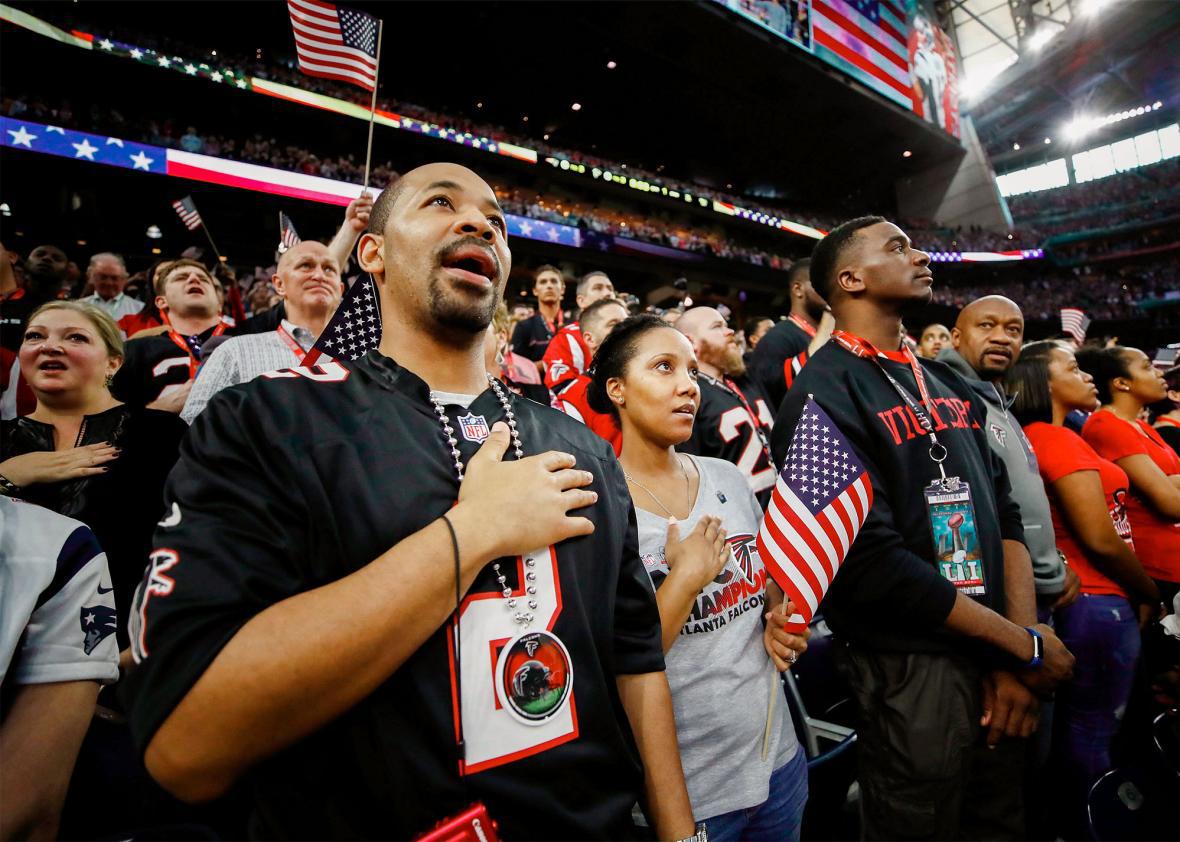On Friday, President Trump elbowed his way into the debate over NFL players and the national anthem. At a campaign rally in Alabama, he urged team owners to get rid of players who kneel—“Get that son of a bitch off the field right now, he’s fired!”—and invited fans to boycott the league. Taking a knee during the anthem was originally about protesting racism in policing and the criminal justice system. Trump recast it as an attack on America. At Monday’s White House briefing, reporters asked press secretary Sarah Huckabee Sanders about Trump’s diatribe. She couldn’t defend his language, so she quoted instead from an essay by Gen. Martin Dempsey, the former chairman of the Joint Chiefs of Staff. Sanders thought Dempsey’s comments backed up the president. But Dempsey and Trump have very different views about the NFL protests and the anthem. Dempsey understands America. Trump does not.
In his essay, written a year ago and reposted by USA Today on Monday, Dempsey argued that the point of the anthem is unity. Fans might cheer for different teams, he noted, but the anthem reminds us that we’re one country. “Standing together during the national anthem at sporting events should be one of those times when we agree, when we focus on the things that bind us together,” Dempsey wrote.
Trump, however, views the anthem as a vehicle not to unite Americans but to divide us. He cursed the dissenting athletes—ignoring their affirmations that they kneel as an alternative way to show respect—and said they should be purged. He made this appeal at a partisan rally, presenting himself not as a servant of the whole country but as a TV star competing with the NFL. He gloated that the league’s ratings were “down massively” and, gesturing to himself, said of viewers: “The No. 1 reason is that they like watching what’s happening … with yours truly.” In effect, Trump reduced patriotism to a sport.
Dempsey described American patriotism as distinctive, grounded in ideals against which the country’s performance should be measured. The loyalty of our troops, he wrote, “is not blind patriotism that pretends there is nothing wrong with the country. Every man and woman in uniform knows we still have work to do to achieve the equality, opportunity and justice for all to which we aspire.” This remaining work, Dempsey noted, was the message of those who knelt for the anthem, though he disagreed with the gesture.
Trump acknowledged none of this. On Friday, he accused the kneelers of “total disrespect of everything that we stand for.” And what does the United States stand for? On that question, Trump was mute. At a press conference on Tuesday, the president said of injured veterans, “They were fighting for our flag, they were fighting for our national anthem”—as though America were a song, not an idea. In tweets and tirades against the kneelers, Trump has said nothing about equality, opportunity, or justice. Nor has he acknowledged what the protesting athletes have said: that they love their country but want it to live up to its ideals, particularly on racism and policing.
One of America’s core values, Dempsey observed, is freedom of speech. “I spent my professional life defending individual rights,” he wrote, “and I did so with the knowledge that sometimes people would use those rights in ways that might be hurtful or insensitive.” Dempsey understood that the kneelers supported the armed services—that was why they knelt instead of sitting—but he also understood that freedom to dissent was part of what his troops fought for. Dempsey never sought to punish or condemn the kneelers. He simply tried to explain “why people like me intend to keep standing.”
On Monday, when Sanders read an excerpt of Dempsey’s column from the White House podium, she skipped a sentence: the one about protecting the right to dissent. To Trump, such constitutional rights are a nuisance. “I know we have freedoms,” he conceded grudgingly at his rally, before concluding that the kneelers should still be fired. In a follow-up tweet and in his Tuesday press conference, he added that players “should not be allowed” to “kneel during the playing of our national anthem.”
What Dempsey understood, above all, is that the anthem protest is about challenging America, not rejecting it. He urged those who “disagree with what America has done” to honor the flag prospectively: to “stand and pay it forward for what you think America should do” and to seek “change from that foundation of promise that is the national anthem.” Team owners say this is why some players kneel: to “spark conversation” and change. Trump has no such vision of the United States as a project. He speaks of making America great again, not of honoring promises it has yet to fulfill.
Trump’s patriotism isn’t about loving America. What he loves is patriotism itself, and only in its most superficial form: flags and anthems. To him, the anthem protest is just a political opportunity. He’s trying to fire up his base, not lead the country. He wants to start a fight between the kneelers, almost all of whom are black, and the white voters who show up at his rallies. But if the president thinks Dempsey is on his side, he’s mistaken. Dempsey has more in common with the kneelers than with Trump. The real debate isn’t between people who stand and people who take a knee. It’s between people who understand America and people who don’t.
